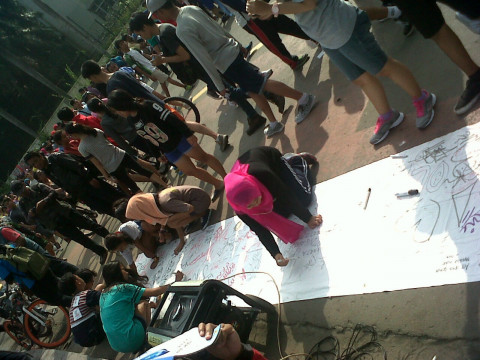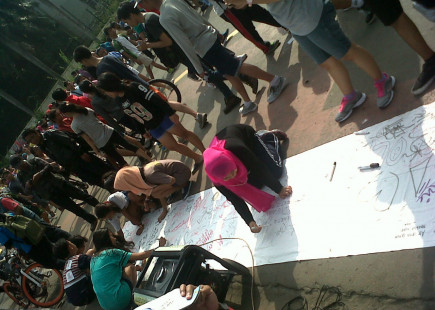Ideas into movement
Boost TNI's work
50 years. Hundreds of social struggles. Countless ideas turned into movement.
Support us as we celebrate our 50th anniversary in 2024.

After 18 years of underperforming private management, water services in Jakarta could be returning to public management to guarantee the human right to water in accordance with the Central Jakarta District Court ruling of 24 March 2015, which annulled the current contract agreements.

Nurhidayah (Solidaritas Perempuan Jakarta)

Nurhidayah (Solidaritas Perempuan Jakarta)
Soon after the court ruling, however, the private water operators denied that they had been negligent in fulfilling Jakarta residents’ human right to water and appealed to the High Court in addition to lobbying the central government to secure their business in water services.[1] The central government also challenged the court ruling in April 2015, arguing that it will cause legal uncertainty and affect other key government projects.
These actions have effectively deterred Jakarta’s municipal administration from taking back water services, as the contract agreements that give private operators an exclusive right to deliver water services remain in effect. It appears that the private operators are buying time through legal tactics in order to maintain the concession contracts until their expiry in 2022. The Central Jakarta District Court ruling is the result of a class action lawsuit filed by residents of Jakarta in November 2012 to denounce water services privatisation. The defendants include the central government, the city’s administration and water utility, and the private water operators. The court ruled in favor of the residents of Jakarta when it declared that the defendants had been negligent in fulfilling the human right to water of Jakarta residents, annulled the contract agreements, and ordered the government to return water services to public management.
The government should respect this ruling to achieve the human right to water instead of challenging it. Universal access to safe drinking water is a human right recognised by the United Nations through resolution 64/292. Water is a vital human need and everyone must have access to safe drinking water.
The reality of Jakarta residents is far from that. People experience difficulties in accessing safe drinking water. This situation is primarily caused by the poor performance of private water services, which barely reach half of the population.[3] Even those who have been connected to the piped water network get insufficient quantity and poor quality water: service outages happen regularly; and residents often receive piped water that is muddy. The failure to improve water services, which limits access to safe water, is a potential case of violation of the right to water.
Instead of following a right to water approach, water services in Jakarta tend to be profit-oriented. It has been particularly so since the government granted water services contracts to two private firms, Palyja and Aetra, in 1997. Water tariffs have increased significantly. At the beginning of the concession, the average water tariff in Jakarta was US$ 0.12 per cubic meter; currently, it is US$ 0.51 per cubic meter. Compared to Surabaya, the second largest city in Indonesia, the Jakarta water tariff is three times more expensive. Most of the tariff hikes occurred under the Automatic Tariff Adjustment policy issued by the government as a result of the private firms’ pressure for higher rates.
In addition, the privately managed water network is highly inefficient, with 44 per cent of water lost before reaching taps. Not to mention the frequent service interruptions. In 2013 alone, the city’s water utility PAM Jaya reported nearly 40,000 complaints regarding tap water outages. [3]
“We residents could not take a shower for three days. Just ask the others, they can’t take a shower either,” said Ida (40), a resident of Cengkareng, West Jakarta, referring to a water outage in April 2014.[4]
“We've asked personnel of Palyja (one of the private operators) in Penjaringan why the water stops running for days, but they said they didn’t know about the water outage. It's very frustrating, how can Palyja’s personnel not know the cause?” said Nadi, a resident of North Jakarta.[5]
Water outages are even worse in the poor areas. People have to compensate by buying water in jerry cans at a much higher price. They usually spend up to Rp 15,000 (US$ 1.06) per day, which is very expensive in a setting where daily income is less than Rp 30,000 (US$ 2.12).[6]
For all these reasons, residents and civil society organisations demand that the government take back water management from the private operators in order to fulfill the people’s right to safe drinking water. Although the Jakarta state government has agreed[7] and taken steps to bring water management back in public hands at an earlier stage,[8] recent events indicate that the central government, for its part, will uphold global water companies’ interests rather than protecting Jakartans’ public health. It is high time that the central and state governments comply with the court ruling and listen to its people, and commit to building a reliable water system. They have to stop relying on Public-Private Partnerships (PPP), which have proven a failure over the last 18 years. They should remind themselves that states are duty-bearers of water and sanitation service provision and need to take action.
[1] Sulistiowati, Tri, “Palyja dan Aetra Lobi Pemerintah Pusat”, Kontan, 25 May 2015, http://nasional.kontan.co.id/news/palyja-dan-aetra-lobi-pemerintah-pusat
[2] “Hampir 40 Ribu Warga Jakarta Keluhkan Air Mati”, JPNN, 30 December 2013, http://www.jpnn.com/read/2013/12/30/208221/Hampir-40-Ribu-Warga-Jakarta…-
[3] Ibid.
[4] Hadi, Feryanto, “Warga Rawa Buaya Tiga Hari Tidak Mandi Karena Air Palyja Mati “, Tribun News, 8 April 2014, http://wartakota.tribunnews.com/2014/04/08/warga-rawa-buayatiga-hari-ti…
[5] “Air PAM Mati, Warga Tamansari Kekeringan”, Suara Pembaruan, 26 September 2011, http://sp.beritasatu.com/home/air-pam-mati-warga-tamansari-kekeringan/1…
[6] Rizki, Mochamad Faizal, “Faisal Berharap Pengelolaan Air Bersih Kembali ke Warga”, Tribun News, 28 June, 2012, http://www.tribunnews.com/metropolitan/2012/06/28/faisal-berharap-penge…
[7] Dewi, Sita W. and Tertiani ZB Simanjuntak, “Jokowi to Cancel Contracts with Water Firms”, The Jakarta Post, 28 March 2013, http://www.thejakartapost.com/news/2013/03/28/jokowi-cancel-contracts-w…
[8] Hairani, Linda, “Ahok Calls on PD PAM Jaya to Acquire Palyja, Tempo, 26 January 2015, http://en.tempo.co/read/news/2015/01/26/057637558/Ahok-Calls-on-PD-PAM-…